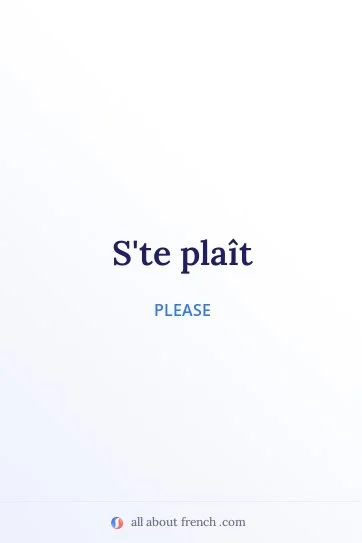
Get prepared to discover all the things you ever wanted to know about the basic French sentence "S'te plaît". To be more precise, it includes a detailed guide of what it is and how to use it in everyday life with an audio example. Plus, we also added some super useful stuff like dialogue example, slow pronunciation audio, synonyms and more!
Translation : Please
Register : Informal - Basic - Slang
Slow
Normal
IPA : / stə plɛ /

"S'te plait" is the informal way to say "Please" in French. It's the shortened version of "S'il te plait" and it literally means "If it pleases you".
Depending on the context, you should either use "S'te plait" (Informal & Singular) or "S'il te plait" (Neutral & Singular) or "S'il vous plaît" (Formal &/or Plural).
So, use "S'te plait" or "S'il te plaît" when talking to only one person and if you "know" this person already (a friend, a lover, a family member or anybody you can be informal with).
For example: "Papa, tu peux m'aider s'te plait ?" (Dad, can you help me, please?)
Now, it's different if you are talking to several people and/or people you should show respect to (strangers, elderly, police, when meeting colleagues, etc.). Here you should use: "S'il vous plait".
For example: "Pouvez-vous me donner le dossier s'il vous plaît ?" (Can you give me the folder please?)
Also, both are invariable, so never add an "s" at "plait" or at "il". Just like you should never conjugate it with the genre and say "S'elle te plait" for example.
Finally, you will probably often see variations of "plait" with 'î' instead of 'i'. Since 1990, both are ok and we prefer using the version with the "simple i" but it's still used for official documents and some other situations. Anyway, you will NEVER be wrong by not putting the accent over the 'i'.
For an even more informal version, you can use "Steup". And for texting, we use massively "Stp" which is even shorter...
The "full" synonyms are:
And if you want something stronger, use one of these:
N.B: Depending on context, "Je t'en prie" can also mean: "You are welcome"
↓ Example in a story with slow audio ↓
Finally, let's see an example in a parallel story with slow audio.
Rendez-vous au restaurant
Date at the restaurant
10%
The story just started!
Get full access to 365 texts and quizzes, including this one.
 Discover more
Discover more Already a member? Full story and quiz here.
